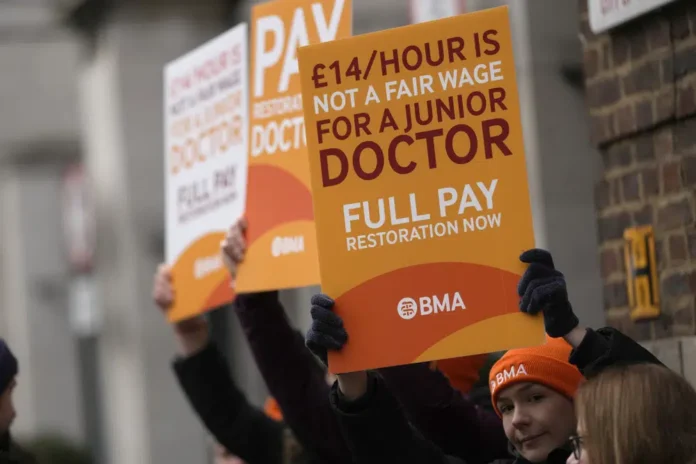LONDON (AP) — Britain is bracing for a four-day walkout by tens of thousands of doctors at the state-funded health care system that one official warned Monday could be “catastrophic” and postpone up to 350,000 appointments.
The strike due to start Tuesday by National Health Service doctors early in their careers comes amid walkouts by public workers across many sectors demanding pay hikes during a cost-of-living crisis. A three-day doctors’ strike last month crippled the system that has been trying to dig out of an appointment backlog that predates the pandemic and has led to longer waiting times to see a doctor.
“These strikes are going to have a catastrophic impact on the capacity of the NHS to recover,” Matthew Taylor, chief executive of the NHS Confederation, told Sky News. “The health service has to meet high levels of demand at the same time as making inroads into that huge backlog.That’s a tough thing to do at the best of times — it’s impossible to do when strikes are continuing.”
With inflation ballooning above 10% and spikes in food and heating costs, wages have fallen in real terms and people have struggled to pay bills. The doctors’ union, the British Medical Association, called for a 35% pay rise to bring trainee salaries back to 2008 levels. According to the BMA, newly qualified healthcare workers earn just over £14 ($17) an hour. Meanwhile, workloads and patient waiting lists are at record levels.
Some public sector unions have agreements with the government, and many do not. Teachers recently rejected pay increases, and nurses are still voting on deals presented last month. Health Secretary Steve Barclay said the doctors’ demands were “unrealistic” and the strike was planned to “cause the maximum disruption”.The Department of Health and Human Services said before negotiations took place. He insists that the strike be called off.
Taylor, who said the strike would endanger patient safety, suggested that the government and unions bring in outside negotiators to break the deadlock.
NHS England’s National Medical Officer Stephen Powis said urgent, urgent and critical care is a priority when he said it was the most devastating in medical history.
Friday, April 26, 2024
More
POPULAR POSTS
© London Post, All Rights Reserved by Independent Media Group UK Limited.






